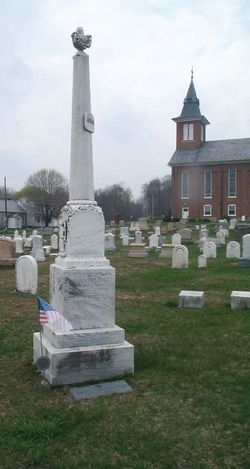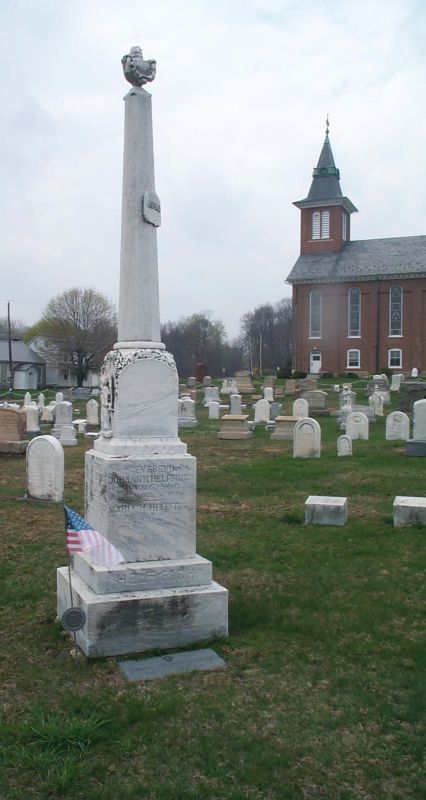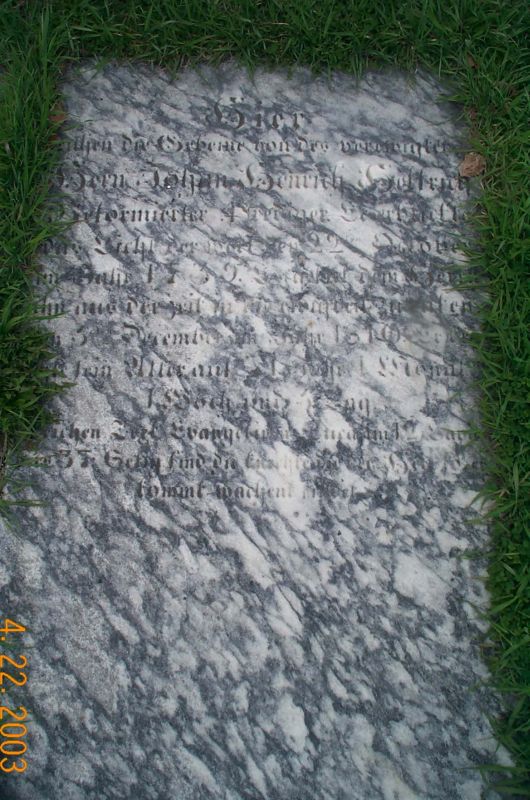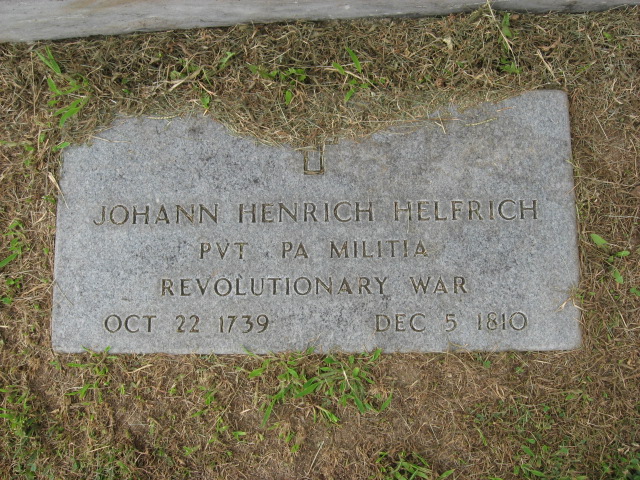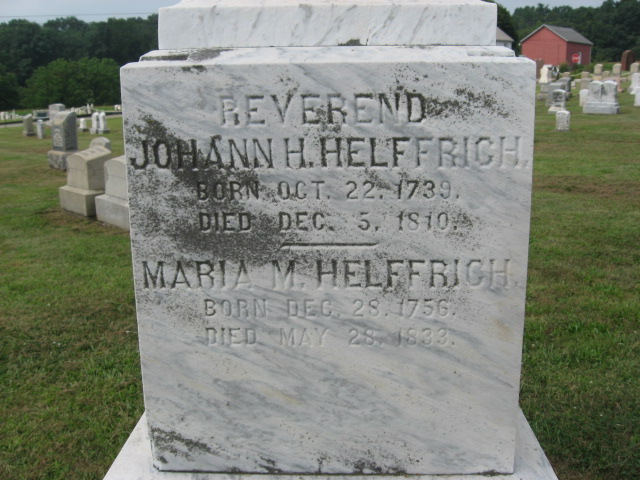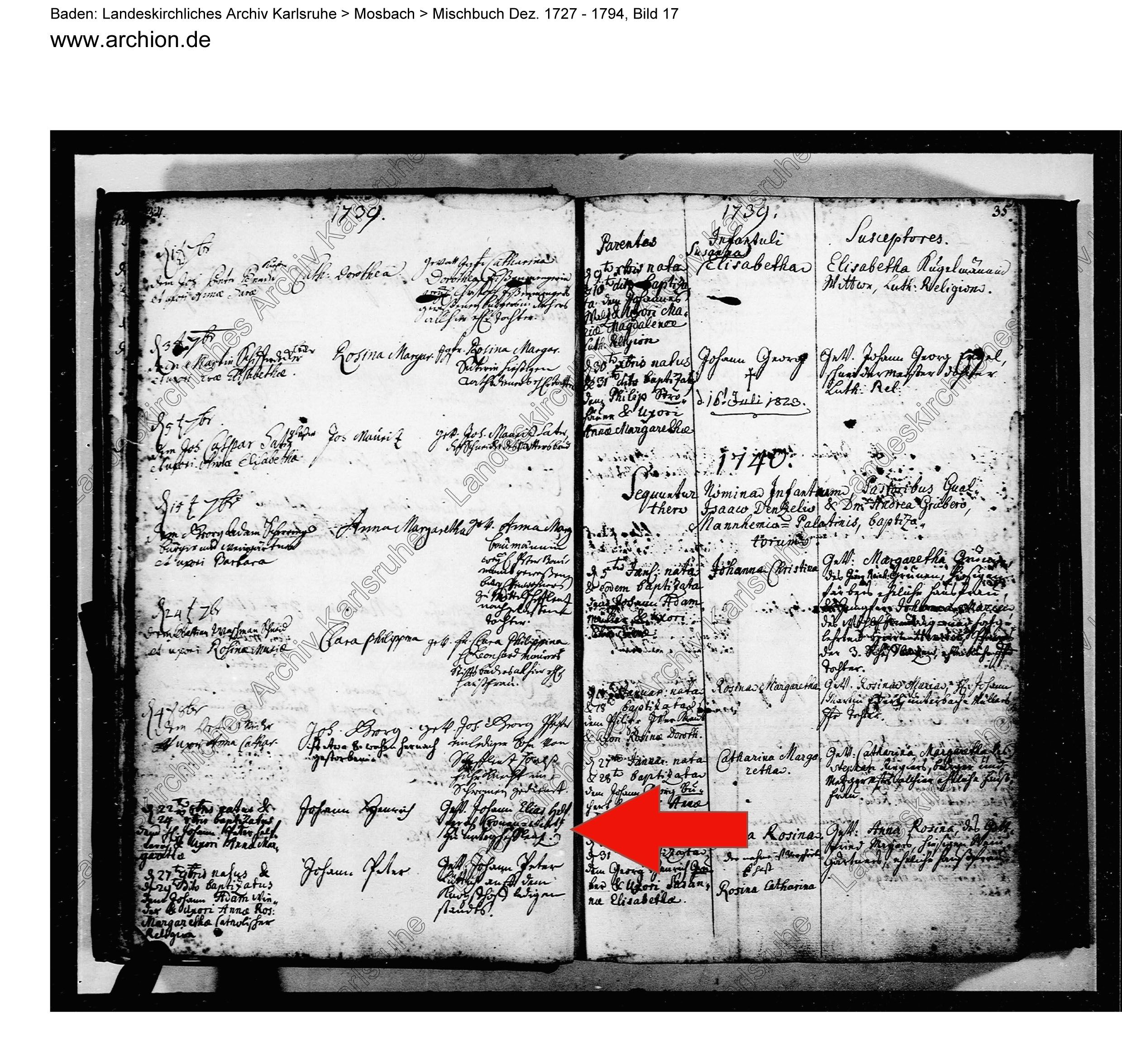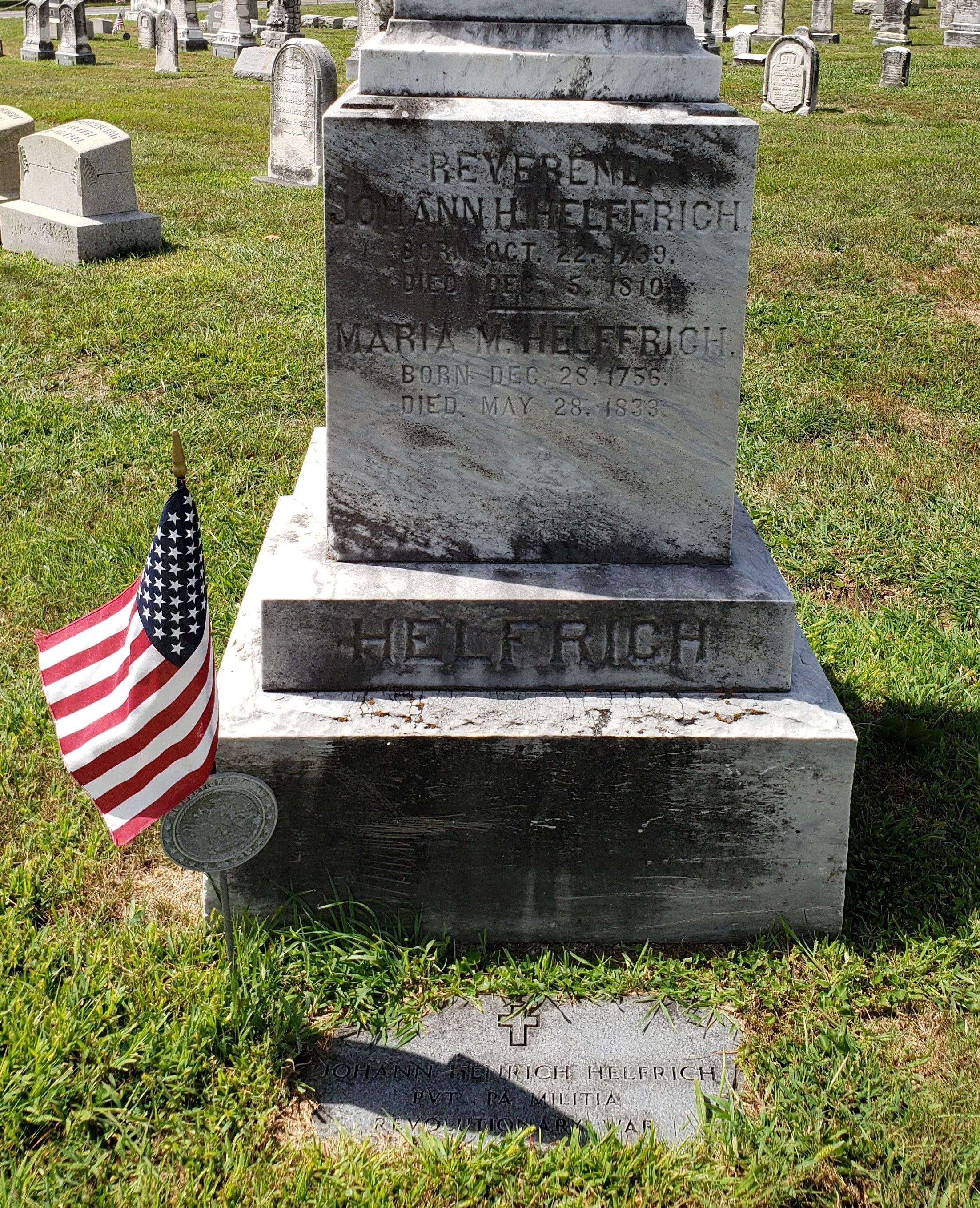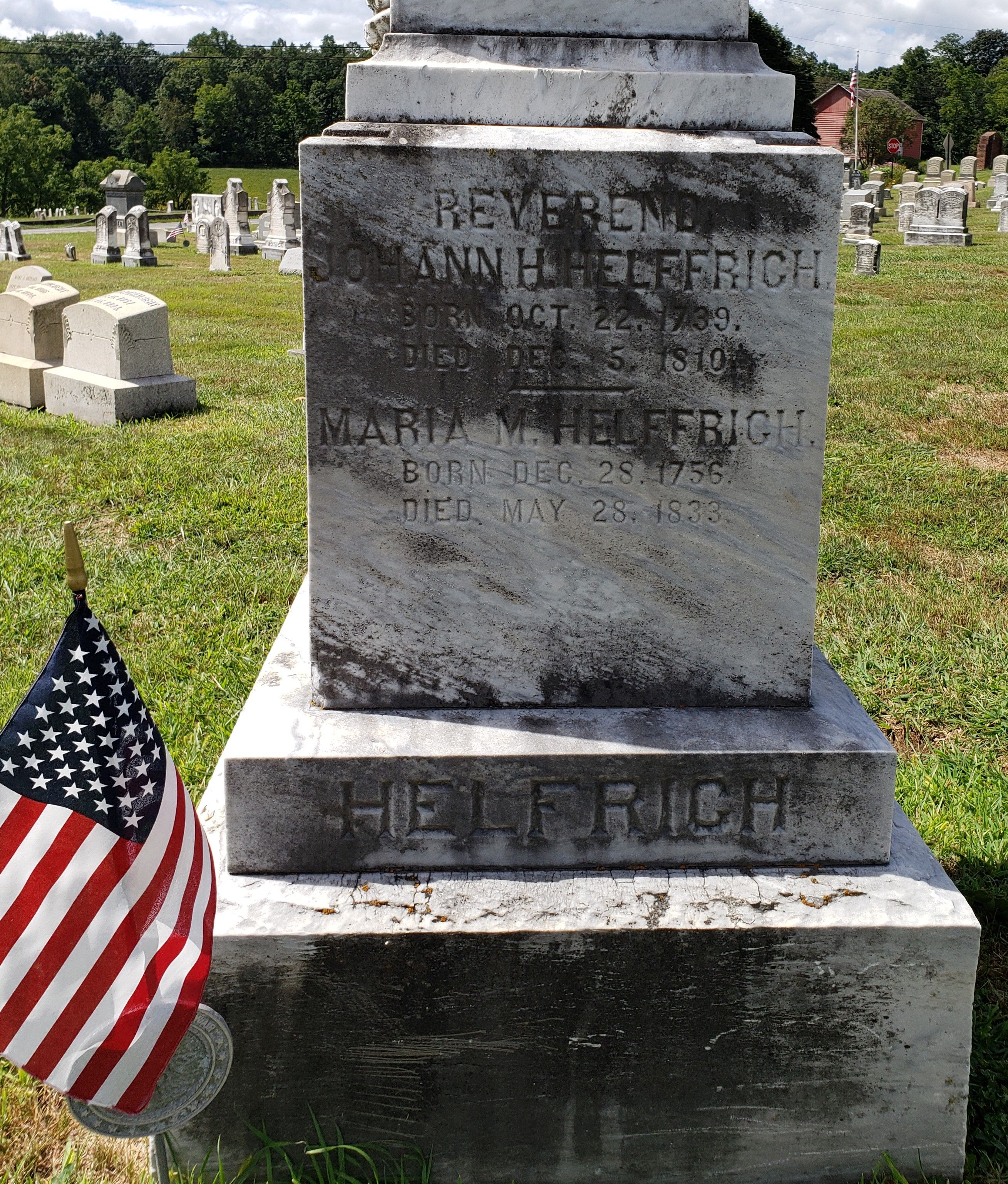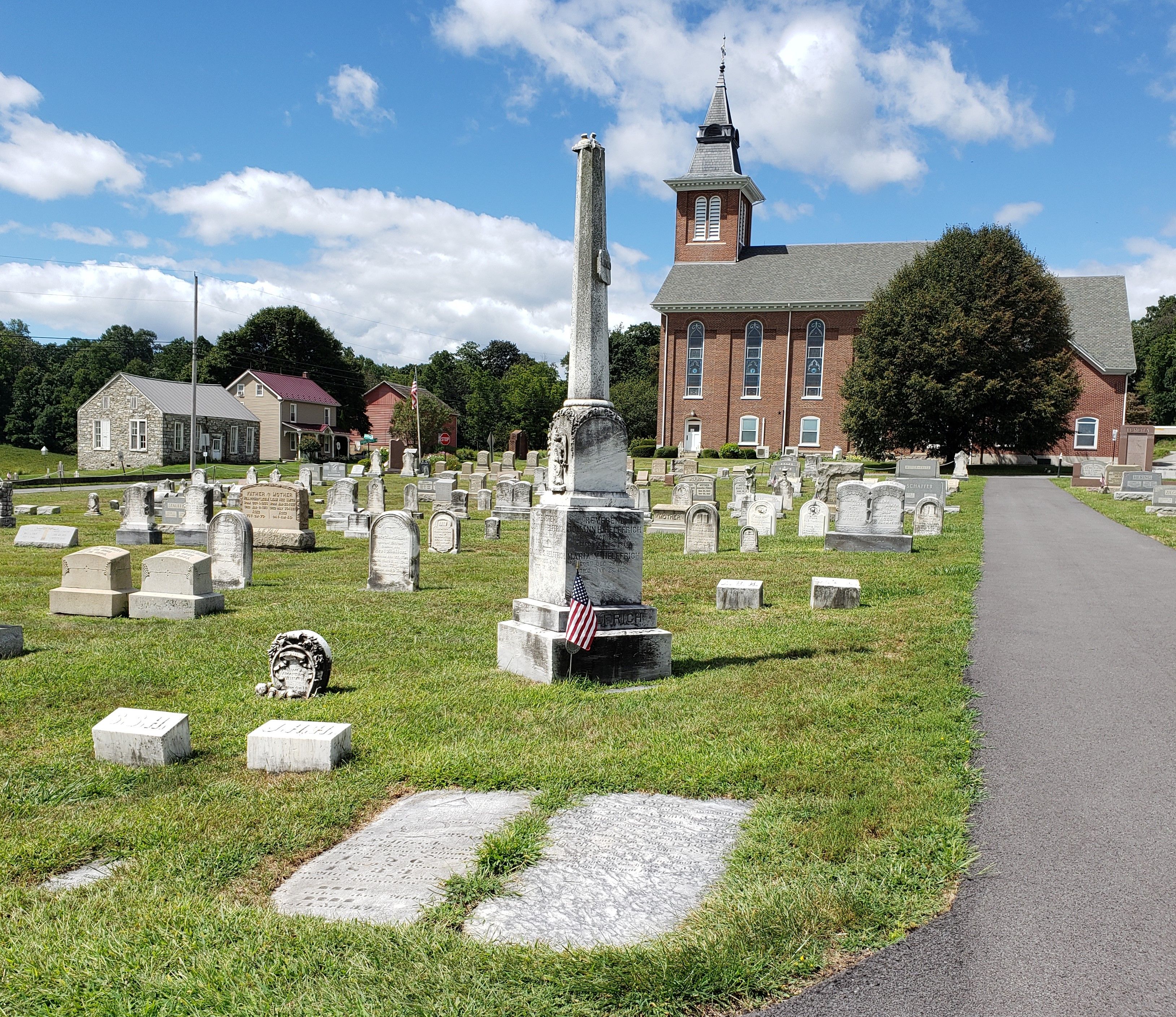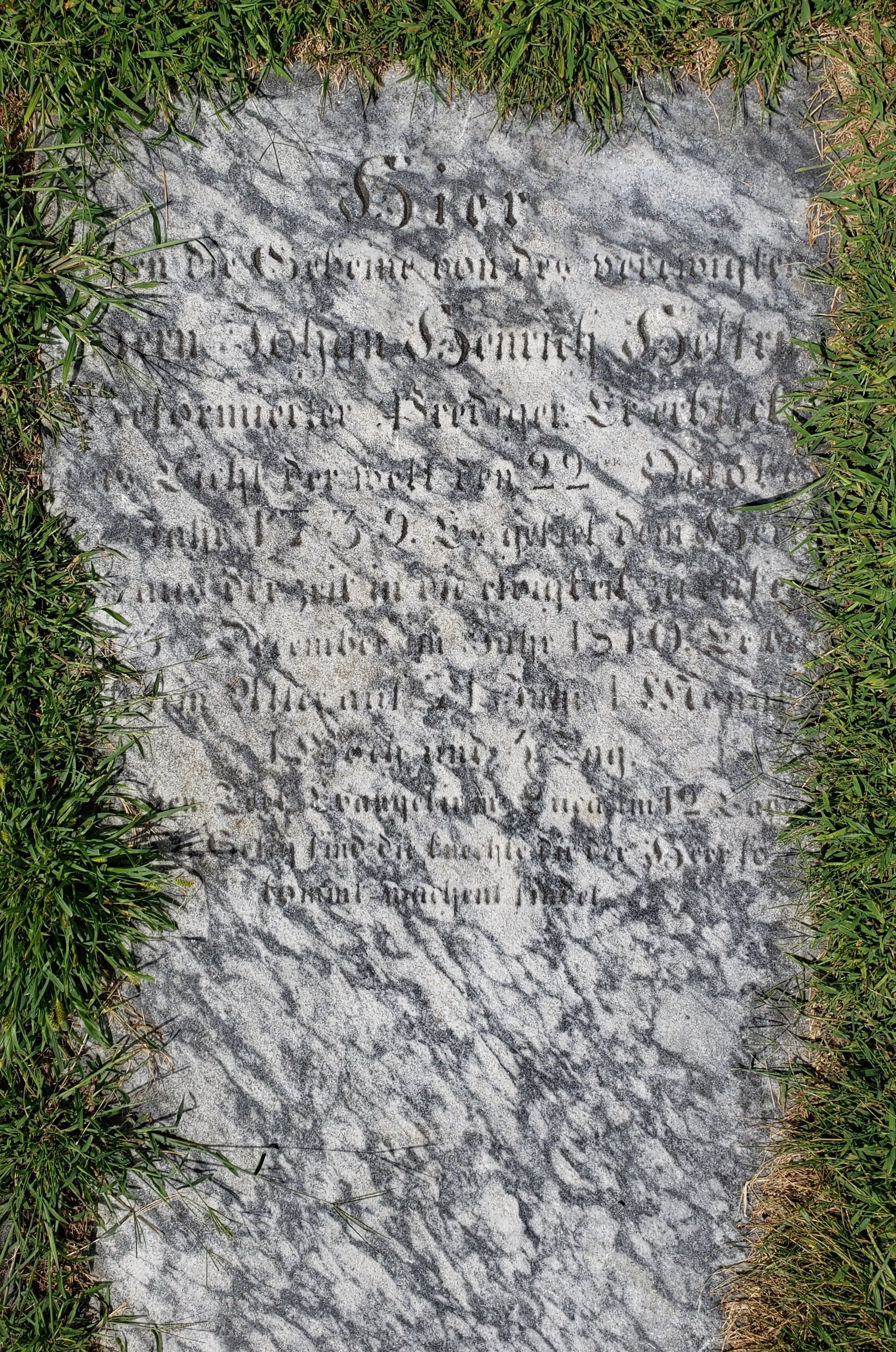Mr. Helffrich was born in Mosbach, a village in Hesse, near Frankfurt-on-the-Mayn, on the 22nd of October, 1739. His parents were Johann Peter Helffrich, and Anna Margaretta, whose maiden name was Horn. His father was burgomaster in Mosbach; but died soon after the birth of this son. His mother was afterwards married to the Rev. Mr. Helfenstein, who was in later years, Inspector and pastor in Sinsheim, and the father of the Rev. Mr. Helfenstein, who labored in this country.
Young Helfferich now spent the years of his childhood in the house of his step-father; and, later, attended with his brothers, the Latin school. After some years he went to the Gymnasium; and, having regularly passed through these schools, he went, in company with his brothers, Albert Conrad Helfenstein and John Henry Helfenstein, to the University of Heidelberg, where they all three devoted themselves to the study of theology. Various manuscripts which he has left behind, and among them a system of dogmatic theology, in Latin, bear testimony to the faithfulness with which he prosecuted his studies.
Having completed his studies, he was examined and licensed on September 22, 1761. After this, he labored as minister in some charge under Inspector Helfenstein, until he received a call from the Synod to go to America. He left for Amsterdam, with his step-brother Helfenstein, in June 1771; whence he sailed, on the 6th of September, 1771, in company with his step-brother, the Rev. J. C. A. Helfenstein, and the Rev. J. G. Gebhard, and landed at New York, January 14, 1772, after a voyage of four months and eight days.
Soon after his arrival, he went to Philadelphia, and from thence to Weissenberg, then in Northampton County, but now in Lehigh County, Pennsylvania, where he took charge, in June of the same year, of the congregations in that region. Here he was married, on the 3rd of November, 1773, to (Maria) Magdalena Sassamanshausen and was soon after presented, by his father-in-law, with a piece of land and dwelling to which he removed, and resided there to the time of his death.
His charge comprehended the following congregations:
Kutztown, where he took charge in 1772;
DeLange, 1772;
Long Swamp, 1778;
Upper Milford, 1779;
Trexlertown, 1784;
Ziegel Church, 1778;
Weissenberg and Lowhill, 1772;
Heidelberg, 1772;
Lyntown, 1804.
Besides these, he also preached in the way of supply, in Mertz's Church, Mosilem, in Berks County, and other places.
In order to obtain a correct idea of the labors of Mr. Helffrich in this field, it is necessary to take a survey of the religious condition of these congregations, when he took charge of them. To found and build up the German Reformed Church, in this region, required altogether different labor from that needed in other parts of Pennsylvania. The antecedents, circumstances, and condition of the people were different. The first German Reformed settlers here were worthy Christian people, the largest number being Huguenot and Swiss families. They came into this country pious, and many of them for the sake of Piety.
The old people say the first thing he did was to organize the consistories in a regular way, and to induce the congregations to unite with the Coetus thus making them properly German Reformed churches. He laid hold of this work with a firm hand; and many of the people, long weary of their dark captivity, showed themselves willing to be led in a better way.
Light and life spread. The Lord was with him, by his victorious Spirit, and established upon him the work of his hands, more and more. Silently and gradually, the midst of the darkness, "The Little Zion rose."
In order to extend his labors over this vast district, he was compelled to preach, not only on the Sabbath, but often on week-days. It was his custom, in order to save time, to bring catechumens from several congregations together in one place, for instruction, and afterwards to confirm them, in the congregations to which they respectively belonged.
There is extant a statistical table of Mr. Helffrich's congregations, covering the period between June 22, 1791, and May 6, 1792, in which the number of heads of families, of baptisms, confirmations, schools, and scholars, in each congregation is given. The congregations included are Heidelberg, Lowhill, DeLange, Kutztown, Upper Milford, Macungie, and Weissenberg. Seven churches, 246 heads of families, 122 baptisms, 76 confirmations, 6 schools, 241 scholars.
"My otherwise strong constitution has, it is true, suffered not a little, through frequent overworking, constant riding, and a fast increasing old age; but that God in whose service I cheerfully consume my strength, has, thus far, sustained me in a way wonderful to myself and my congregations; for which we cease not to praise Him. Often have I proposed to give up some of my congregations; but neither begging nor remonstrance has enabled me to succeed in obtaining the object of my desire. The earnest entreaties of my people, the touching representations of their circumstances, and the great love shown towards me, have frustrated every attempt I have made to reduce my charge to more convenient limits, or to accept a call to a charge better suited to my strength."
Mr. Helffrich was devotedly attached to his people; laboring as a father among them, and sympathizing with them in all their interests. At the time of the insurrection, during the administration of President Adams, many of his people were drawn into the rebellion, especially in Upper Milford and Macungie. He went to Easton, when the hearing took place, and used all his influence to induce the judges to deal mercifully with them, as they had been seduced in procuring the pardon of many misguided people. From a letter written to him by Marshall John Arndt, he is assured of the high regard entertained for him by the civil authorities.
Soon after the beginning of this rebellion, a detachment of soldiers was sent to Upper Milford, to subdue the instigators of the disturbance. Mr. Helffrich had a funeral at that place, at the same time. On his return innocently riding past the encampment, he was accosted by the captain,
"Who's here?"
Helffrich gave his name.
"What is your business?"
"I preach the gospel and serve my God."
"Do you also serve your country?"
"My God I serve first, and then also my country."
"How are you disposed toward the present administration?"
"Let every soul be subject to the higher powers."
The captain was satisfied with his answer, and permitted him to pass on.
Mr. Helffrich was a very punctual and prompt man, and consequently always reliable. He generally rode on horseback to his appointments, and in his pastoral visits. No weather kept him back. He was decided, and yet mild; combining, in a remarkably happy manner, the authority and dignity of his office, with gentleness and mercy, and open-hearted familiarity among his people.
His preaching was instructive. He always confined himself closely to his text; and was in the habit of writing nearly all his sermons. Having the advantage of a good education, and possessing a warm heart, he was regarded, in his day, as a superior preacher. His delivery was somewhat quick, but distinct, and he was gifted with a strong but musical voice. He testified fearlessly against sin, and sustained his public teaching by a consistent private life.
In person, Mr. Helffrich was pretty large, and firmly built. He had an open, lively, and benevolent countenance. He had black hair, and was near-sighted, on which account he wore glasses.
In his family, he was faithful, friendly, and greatly beloved. Meeting the qualifications designated by the apostle, he was a bishop "that ruled well his own house, having his children in subjection, with all gravity." When at home, he ended the day by calling together his family, reading the Bible, hearing his children recite the catechism, and explaining it; closing the exercise with prayer. In all his intercourse with his family and his people, he was cheerful, hopeful, and devoted to them and his God. One of his sons, who has also been called home, became a minister; and several of his grandsons are yet actively engaged in the holy service.
During his ministry, Mr. Helffrich baptized 5830, and confirmed 4000 souls. He may be regarded as the Father of the German Reformed Church, in the field over which his labors extended.
The time now drew near when the Master saw it good to release the venerable man from his earthly labors, and call him to his eternal reward. On the 5th of December, 1810, as he was in the act of mounting his horse, to visit the widow of his old friend Lehman, who was sick, he was struck with palsy, and died suddenly. He was carried to his bed, where he only yet uttered these words: "O how well I lie here!" He fell sweetly asleep, and rested from his long and arduous labors.
A few days later, the greater part of his members, and the neighboring ministers belonging to the Synod, attended his funeral. The Rev. Mr. Blumer delivered a discourse at the house; and the Rev. Mr. Vandersloot preached at the grave, from the words, Luke XXII, 37: "Blessed are those servants whom the Lord, when He cometh, shall find watching."
He lies buried in the Sassamanshausen private family graveyard. In Maxatawny, Berks County, where a marble slab, with the following inscription, covers his grave:
Hier ruhen die Gebeine von dem verewigten
Hern Johan Henrich Helffrich,
Reformierter Prediger
Er erblickte das Licht der Welt
Den 22sten Oktober, im Jahr 1739
Es gefiel dem Herrn ihn aus der
Zeit in die Ewigkeit zu nehmen
Den 5ten Dezember, im Jahr 1810. Er
Brachte sein Alter auf 77 Jahr, 1 Monath, 1 Woche, und 5 Tage.
XXX evangelischen XXX
Lk 12,37: Selig sind die Knechte, die der Herr, so er kommt, wachend findet.
TRANSLATION:
Here rest the bones of the eternalized
Mister Johan Henrich Helffrich,
Reverend of the Reformed Church
He caught sight of the light of the world
on the 22st of October in the year 1739
The Lord chose to take him out of
time into eternity
on the 5th of December, in the year 1810. He
reached an age of 77 years, 1 month, 1 week, and 5 days.
(Unreadable text)
Luke 12,37: Blessed are those servants, whom
the Lord will find watching when he comes.
Mr. Helffrich was born in Mosbach, a village in Hesse, near Frankfurt-on-the-Mayn, on the 22nd of October, 1739. His parents were Johann Peter Helffrich, and Anna Margaretta, whose maiden name was Horn. His father was burgomaster in Mosbach; but died soon after the birth of this son. His mother was afterwards married to the Rev. Mr. Helfenstein, who was in later years, Inspector and pastor in Sinsheim, and the father of the Rev. Mr. Helfenstein, who labored in this country.
Young Helfferich now spent the years of his childhood in the house of his step-father; and, later, attended with his brothers, the Latin school. After some years he went to the Gymnasium; and, having regularly passed through these schools, he went, in company with his brothers, Albert Conrad Helfenstein and John Henry Helfenstein, to the University of Heidelberg, where they all three devoted themselves to the study of theology. Various manuscripts which he has left behind, and among them a system of dogmatic theology, in Latin, bear testimony to the faithfulness with which he prosecuted his studies.
Having completed his studies, he was examined and licensed on September 22, 1761. After this, he labored as minister in some charge under Inspector Helfenstein, until he received a call from the Synod to go to America. He left for Amsterdam, with his step-brother Helfenstein, in June 1771; whence he sailed, on the 6th of September, 1771, in company with his step-brother, the Rev. J. C. A. Helfenstein, and the Rev. J. G. Gebhard, and landed at New York, January 14, 1772, after a voyage of four months and eight days.
Soon after his arrival, he went to Philadelphia, and from thence to Weissenberg, then in Northampton County, but now in Lehigh County, Pennsylvania, where he took charge, in June of the same year, of the congregations in that region. Here he was married, on the 3rd of November, 1773, to (Maria) Magdalena Sassamanshausen and was soon after presented, by his father-in-law, with a piece of land and dwelling to which he removed, and resided there to the time of his death.
His charge comprehended the following congregations:
Kutztown, where he took charge in 1772;
DeLange, 1772;
Long Swamp, 1778;
Upper Milford, 1779;
Trexlertown, 1784;
Ziegel Church, 1778;
Weissenberg and Lowhill, 1772;
Heidelberg, 1772;
Lyntown, 1804.
Besides these, he also preached in the way of supply, in Mertz's Church, Mosilem, in Berks County, and other places.
In order to obtain a correct idea of the labors of Mr. Helffrich in this field, it is necessary to take a survey of the religious condition of these congregations, when he took charge of them. To found and build up the German Reformed Church, in this region, required altogether different labor from that needed in other parts of Pennsylvania. The antecedents, circumstances, and condition of the people were different. The first German Reformed settlers here were worthy Christian people, the largest number being Huguenot and Swiss families. They came into this country pious, and many of them for the sake of Piety.
The old people say the first thing he did was to organize the consistories in a regular way, and to induce the congregations to unite with the Coetus thus making them properly German Reformed churches. He laid hold of this work with a firm hand; and many of the people, long weary of their dark captivity, showed themselves willing to be led in a better way.
Light and life spread. The Lord was with him, by his victorious Spirit, and established upon him the work of his hands, more and more. Silently and gradually, the midst of the darkness, "The Little Zion rose."
In order to extend his labors over this vast district, he was compelled to preach, not only on the Sabbath, but often on week-days. It was his custom, in order to save time, to bring catechumens from several congregations together in one place, for instruction, and afterwards to confirm them, in the congregations to which they respectively belonged.
There is extant a statistical table of Mr. Helffrich's congregations, covering the period between June 22, 1791, and May 6, 1792, in which the number of heads of families, of baptisms, confirmations, schools, and scholars, in each congregation is given. The congregations included are Heidelberg, Lowhill, DeLange, Kutztown, Upper Milford, Macungie, and Weissenberg. Seven churches, 246 heads of families, 122 baptisms, 76 confirmations, 6 schools, 241 scholars.
"My otherwise strong constitution has, it is true, suffered not a little, through frequent overworking, constant riding, and a fast increasing old age; but that God in whose service I cheerfully consume my strength, has, thus far, sustained me in a way wonderful to myself and my congregations; for which we cease not to praise Him. Often have I proposed to give up some of my congregations; but neither begging nor remonstrance has enabled me to succeed in obtaining the object of my desire. The earnest entreaties of my people, the touching representations of their circumstances, and the great love shown towards me, have frustrated every attempt I have made to reduce my charge to more convenient limits, or to accept a call to a charge better suited to my strength."
Mr. Helffrich was devotedly attached to his people; laboring as a father among them, and sympathizing with them in all their interests. At the time of the insurrection, during the administration of President Adams, many of his people were drawn into the rebellion, especially in Upper Milford and Macungie. He went to Easton, when the hearing took place, and used all his influence to induce the judges to deal mercifully with them, as they had been seduced in procuring the pardon of many misguided people. From a letter written to him by Marshall John Arndt, he is assured of the high regard entertained for him by the civil authorities.
Soon after the beginning of this rebellion, a detachment of soldiers was sent to Upper Milford, to subdue the instigators of the disturbance. Mr. Helffrich had a funeral at that place, at the same time. On his return innocently riding past the encampment, he was accosted by the captain,
"Who's here?"
Helffrich gave his name.
"What is your business?"
"I preach the gospel and serve my God."
"Do you also serve your country?"
"My God I serve first, and then also my country."
"How are you disposed toward the present administration?"
"Let every soul be subject to the higher powers."
The captain was satisfied with his answer, and permitted him to pass on.
Mr. Helffrich was a very punctual and prompt man, and consequently always reliable. He generally rode on horseback to his appointments, and in his pastoral visits. No weather kept him back. He was decided, and yet mild; combining, in a remarkably happy manner, the authority and dignity of his office, with gentleness and mercy, and open-hearted familiarity among his people.
His preaching was instructive. He always confined himself closely to his text; and was in the habit of writing nearly all his sermons. Having the advantage of a good education, and possessing a warm heart, he was regarded, in his day, as a superior preacher. His delivery was somewhat quick, but distinct, and he was gifted with a strong but musical voice. He testified fearlessly against sin, and sustained his public teaching by a consistent private life.
In person, Mr. Helffrich was pretty large, and firmly built. He had an open, lively, and benevolent countenance. He had black hair, and was near-sighted, on which account he wore glasses.
In his family, he was faithful, friendly, and greatly beloved. Meeting the qualifications designated by the apostle, he was a bishop "that ruled well his own house, having his children in subjection, with all gravity." When at home, he ended the day by calling together his family, reading the Bible, hearing his children recite the catechism, and explaining it; closing the exercise with prayer. In all his intercourse with his family and his people, he was cheerful, hopeful, and devoted to them and his God. One of his sons, who has also been called home, became a minister; and several of his grandsons are yet actively engaged in the holy service.
During his ministry, Mr. Helffrich baptized 5830, and confirmed 4000 souls. He may be regarded as the Father of the German Reformed Church, in the field over which his labors extended.
The time now drew near when the Master saw it good to release the venerable man from his earthly labors, and call him to his eternal reward. On the 5th of December, 1810, as he was in the act of mounting his horse, to visit the widow of his old friend Lehman, who was sick, he was struck with palsy, and died suddenly. He was carried to his bed, where he only yet uttered these words: "O how well I lie here!" He fell sweetly asleep, and rested from his long and arduous labors.
A few days later, the greater part of his members, and the neighboring ministers belonging to the Synod, attended his funeral. The Rev. Mr. Blumer delivered a discourse at the house; and the Rev. Mr. Vandersloot preached at the grave, from the words, Luke XXII, 37: "Blessed are those servants whom the Lord, when He cometh, shall find watching."
He lies buried in the Sassamanshausen private family graveyard. In Maxatawny, Berks County, where a marble slab, with the following inscription, covers his grave:
Hier ruhen die Gebeine von dem verewigten
Hern Johan Henrich Helffrich,
Reformierter Prediger
Er erblickte das Licht der Welt
Den 22sten Oktober, im Jahr 1739
Es gefiel dem Herrn ihn aus der
Zeit in die Ewigkeit zu nehmen
Den 5ten Dezember, im Jahr 1810. Er
Brachte sein Alter auf 77 Jahr, 1 Monath, 1 Woche, und 5 Tage.
XXX evangelischen XXX
Lk 12,37: Selig sind die Knechte, die der Herr, so er kommt, wachend findet.
TRANSLATION:
Here rest the bones of the eternalized
Mister Johan Henrich Helffrich,
Reverend of the Reformed Church
He caught sight of the light of the world
on the 22st of October in the year 1739
The Lord chose to take him out of
time into eternity
on the 5th of December, in the year 1810. He
reached an age of 77 years, 1 month, 1 week, and 5 days.
(Unreadable text)
Luke 12,37: Blessed are those servants, whom
the Lord will find watching when he comes.
Inscription
PVT. PA. MILITIA REVOLUTIONARY WAR
Gravesite Details
REV. AFTER THE REV. WAR.. HUSBAND OF MARIA M. HELFFRICH
Family Members
Advertisement
Records on Ancestry
Sponsored by Ancestry
Advertisement
